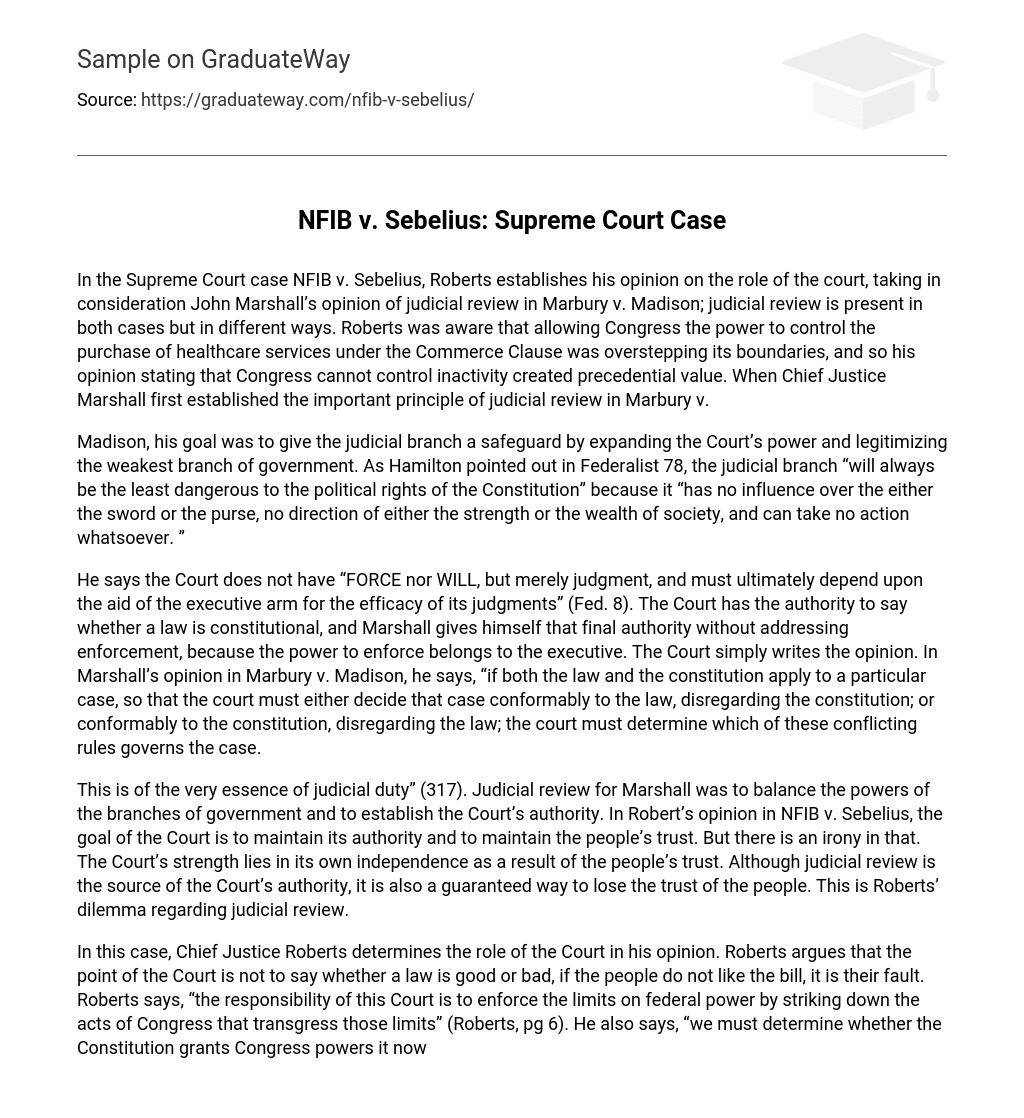In the Supreme Court case NFIB v. Sebelius, Chief Justice Roberts discusses his perspective on the court’s role and considers John Marshall’s opinion on judicial review in Marbury v. Madison. While both cases involve judicial review, they have distinct interpretations. Chief Justice Roberts acknowledges that allowing Congress to regulate healthcare purchasing under the Commerce Clause exceeds its jurisdiction and concludes that Congress cannot regulate inactivity. Consequently, his opinion establishes a precedent. The concept of judicial review was initially introduced by Chief Justice Marshall in Marbury v.
Madison aimed to enhance the power of the Court and validate the most vulnerable branch of government. Hamilton noted in Federalist 78 that the judicial branch poses minimal threat to the political rights of the Constitution. This is due to its lack of control over military or financial resources and inability to take any form of action.
According to Marshall in Federalist No. 8, the Court lacks force and will, relying instead on the executive branch to enforce its judgments. In his opinion in Marbury v. Madison, Marshall claims that the Court has the authority to determine the constitutionality of laws but does not address enforcement, as that falls under the executive’s jurisdiction. The Court only writes the opinion. If a particular case is subject to both the law and the constitution, creating a conflict, the Court must decide which rule governs the case.
Marshall (317) states that judicial duty includes balancing government branches’ powers and establishing the Court’s authority. Roberts, in NFIB v. Sebelius, asserts that the Court strives to preserve its authority and gain people’s trust. However, there is irony in this situation: the Court’s strength depends on its independence, which is founded on people’s trust. Judicial review, while a source of the Court’s authority, can also lead to loss of trust from the people. Therefore, Roberts confronts a dilemma regarding judicial review.
Chief Justice Roberts asserts that the Court’s role is to enforce constraints on federal power, rather than pass judgment on the merits of a law. He emphasizes that if individuals are dissatisfied with legislation, it is their obligation and not the Court’s responsibility. Roberts states that it is essential for the Court to invalidate any actions by Congress that surpass these limits. Furthermore, he underscores the importance of scrutinizing whether Congress assumes powers not authorized by the Constitution and opposed by numerous States and individuals.
In NFIB v. Sebelius (Roberts, pg 2), the Court must assess the Government’s power limitations and its role in enforcing them. Roberts contends that it is crucial for the Court to guarantee the constitutionality of its rulings and uphold the will of the people. This case now establishes a precedent for future comparable cases. In her opinion, Justice Ginsburg recognizes that up until now, the Court has pragmatically determined if Congress has legitimately exercised its commerce power by adhering to two well-known principles (Ginsburg, pg 15).
According to Ginsburg (pg 16), the original concept was that Congress had the power to regulate activities with a significant impact on interstate commerce, as long as there was a rational basis. Additionally, the methods chosen for regulation must be reasonably connected to the desired results. In this instance, the Chief Justice recognized that Congress has extensive authority to regulate interstate commerce but pointed out its previous failure to exercise this power in mandating individual product purchases. He emphasized that the wording of the Clause suggests a need for regulating certain types of activity.
Roberts asserts that Congress lacks the authority to regulate something non-existent, establishing a distinct limit on its power unlike the vague substantial effects and rational basis test. This case serves as a reference for handling similar cases in the future. Roberts acknowledges that regulating individuals based on their inaction would exceed the Commerce Clause’s scope and change citizens’ interaction with the federal government.
The Court has stated that Congress’s power under the Commerce Clause is restricted to regulating commercial activity and cannot be used to compel individuals to participate in such activity. This ruling imposes a new limitation on Congress’s jurisdiction and underscores the presence of restrictions on its authority granted by the Commerce Clause.
Works Cited
Lunder, Erika K. and Jennifer Staman discuss the constitutionality of the individual mandate in NFIB v. Sebelius, providing an overview of the case and its implications. They refer to a report from the Congressional Research Service and the Supreme Court decision, National Federation of Independent Business v. Sebelius.





